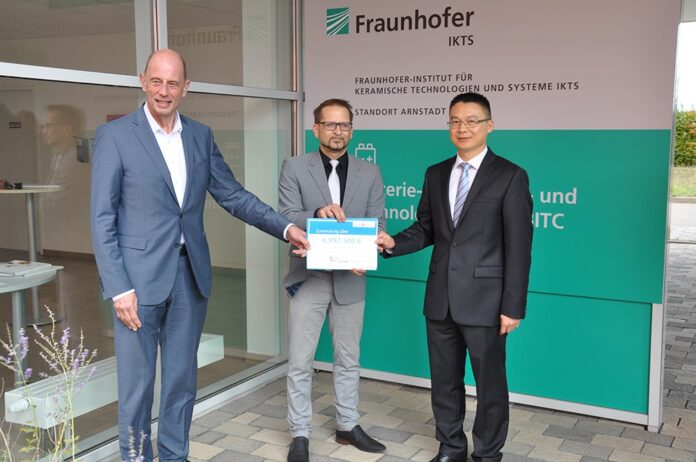
In Germany, Fraunhofer IKTS has just launched the research project called BattLife at the newly founded Battery Innovation and Technology Center BITC at Erfurter Kreuz. The industry partner of the project is Contemporary Amperex Technology Thuringia GmbH (CATT), a subsidiary of the Chinese battery manufacturer Contemporary Amperex Technology Co., Limited (CATL). As part of the project, a digitized test centre for batteries and battery components will be established at BITC.
Earlier this year, Fraunhofer IKTS opened a branch office called the Battery Innovation and Technology Center (BITC) at Erfurter Kreuz. The new BITC is to “intensify existing collaborations with CATL,” said the German institute. The expanding Chinese battery supplier is currently building its first cell production facility outside of China at the Erfurter Kreuz industrial site and expects to have production running in early 2022.
In the project, which is properly called the Big Data Test Environment for Battery Life Modeling, the researchers want to work on new approaches to developing more accurate lifetime predictions and initiate further innovation processes that will extend the life of batteries.
The state of Thuringia is supporting the research project with five million euros. For this reason, BITC director Roland Weidl and CATT plant manager Jason Chen were on-site at the event, as was Thuringia’s Minister of Economics and Science Wolfgang Tiefensee. “In addition to good charging infrastructure, the service life of batteries is one of the most important prerequisites for making electromobility fit for the future,” said Tiefensee. BattLife thus makes an important contribution to the sustainable development of car batteries. But according to Fraunhofer, the project also represents “the beginning of an exemplary symbiosis of research and industry, for which the state has made enormous efforts over the past three years”.
According to Weidl, given the discussions about raw material extraction and recycling plans, extending battery life is crucial for the further development and acceptance of e-mobility. “We are now setting up a test centre that will analyse battery cells in industry-relevant quantities,” says the BITC director. “By cooperating with CATT, our results can once again flow directly into the production process.”
“In addition to a good charging infrastructure, the service life of batteries is one of the most important prerequisites for making electromobility fit for the future,” emphasizes Economy and Science Minister Wolfgang Tiefensee. “BattLife” thus makes an important contribution to the sustainable development of car batteries. The project also represents the beginning of an exemplary symbiosis of research and industry, for which the state has made enormous efforts in the last three years. “Our goal was not only to bring CATL to Thuringia, but also to contribute to research right from the start in order to expand activities in the field of battery and energy storage technology and thus develop Thuringia into a leading battery hub.” said Tiefensee.
The BITC, which is supported by the state of Thuringia with over 13.5 million euros, started work in the Erfurter Kreuz industrial park in July of this year. As a branch of the Fraunhofer Institute for Ceramic Technologies and Systems IKTS – one of the largest battery research institutes in Germany – it develops system solutions for the networked, digitally supported production and quality assurance of battery cells and modules. Over the next five years, the state will support the development of the center into a Europe-wide beacon for energy-efficient and resource-saving battery production.
BITC’s mission is to engage in development-related cooperations with Thuringia-based companies and research institutions in order to pool know-how directly at the site of battery cell production. The industrial partner of the first “BattLife” project is CATT, a local subsidiary of the Chinese battery manufacturer CATL.



